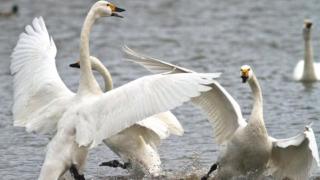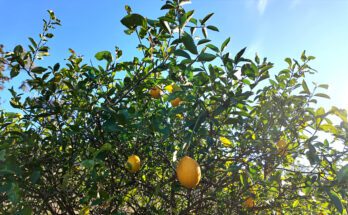
Image copyright
Graham Hann/WWT
A study into the reputation for “aggressiveness” of swans has found they are more likely to be hostile to their own kind than to other birds.
The University of Exeter and Wildfowl and Wetlands Trust (WWT) research was carried out at sites in Gloucestershire and Dumfries and Galloway.
Three species of swan – mute, whooper and Bewick’s – were all most frequently aggressive to other swans.
The WWT said this made “ecological sense” in the fight for food sources.
Image copyright
PA Media
The research was undertaken to better understand how swan behaviour affects other waterbirds over winter.
Dr Kevin Wood, from the WWT, said: “We know that swans have a reputation for aggressiveness but some of us suspected that in reality a lot of the aggression was directed towards other swans rather than smaller birds such as ducks or geese.
“To test that idea, we recruited some great students who used the webcams at Slimbridge and Caerlaverock to collect behavioural data on aggressive interactions between the various waterbirds at those sites over the past two winters.
“Our suspicions were right.”
Image copyright
PA Media
He said almost all of the waterbird species in the study were most aggressive towards their own kind which was likely to be because they were the “greatest competition for food and other resources”.
“It’s valuable to finally have the data to show that, and it’s another rung on the ladder of better-informed judgment on swans,” he added.
The study was carried out by monitoring live-stream webcams on reserves at WWT Slimbridge Wetland Centre in Gloucestershire and WWT Caerlaverock Wetland Centre near Dumfries over the past two years.
Image copyright
PA Media
It is one of the first studies to rely completely on remotely collected data and could be one of the solutions to continuing research with restrictions in place during the Covid-19 pandemic.
Dr Paul Rose, from the University of Exeter, said: “This is a great example of how undergraduate projects can really help wild conservation action by allowing students to practise key research techniques but at the same time collecting data that is valuable to field scientists.”
The next step is to study other waterbirds to see how their behaviour alters depending on the presence and number of swans.
Read MoreFeedzy


